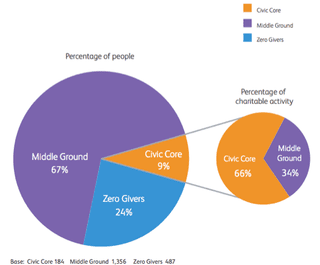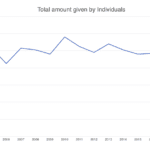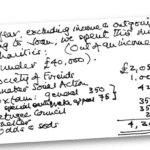There are three types of supporter
CAF have just released a new report that segments the UK population according to their attitude to charity. They have identified three key groups – The Civic Core, The Middle Ground and Zero Givers.
 The Civic Core, volunteer the most, donate most goods to shops, campaign the most, are most likely to help out in their community, run charity events and undertake local fundraising activities.
The Civic Core, volunteer the most, donate most goods to shops, campaign the most, are most likely to help out in their community, run charity events and undertake local fundraising activities.
They comprise just 9% of the UK population but account for 66% of the country's charitable activity.
But importantly, they don't necessarily donate the most money.
That accolade goes to the Middle Ground. 83% of this group (which makes up over two-thirds of the UK population) give donations to charity, in comparison to 82% of the Civic Core and just 2% amongst the appropriately named, Zero givers.
This is a very important point. Though we may have a super committed core that undertake the lion's share of the UK's charity activity, we have a much larger group who are happy to hand over the cash and let others get on with it.
Middle Ground donors obviously care. But they aren't necessarily engaged enough to make the time to do more. There are many reasons for this, but sadly the CAF report doesn't focus on them or suggest what we might do to change their behaviour.
In my experience, this Middle Ground genuinely want to see how their giving has made a difference, but they are most likely to be bored and turned off by communications that simply talk about what the charity is doing. The lack of personal relevance fails to engage them.
As a result they carry on giving almost in spite of what charities do or say.
Three quick tips for changing attitudes amongst the middle ground would be to…
- Beef up your thank you programme. Put real effort into making sure a donor feels valued.
- Rather than hitting them with a stream of disparate appeals, take a focus on two or three projects where donors can see real change happen over time. This is a far more effective approach than sending out communications aimed at demonstrating just how much work you do or how many people you help.
- Supplement your appeals with a secondary non-financial request related to work a donor has already funded. Ask them to campaign or undertake an activity in support of a project they have an emotional and financial link to.
The full report, Britain's Civic Core can be downloaded here (PDF)









